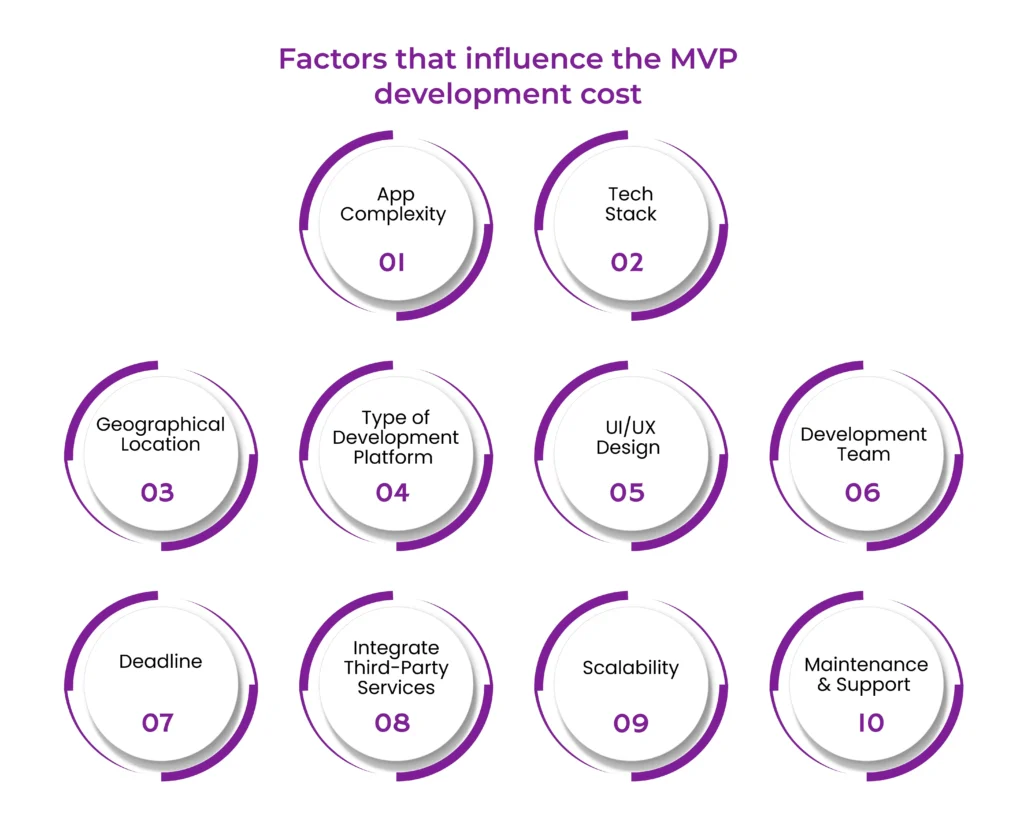
Have you ever wondered how much it costs to develop MVP? If yes, then you’ve landed at the right place. Knowing the cost will help you build an MVP without hassle.
Minimum viable product (MVP) development is the best way to launch your product or service quickly. This approach increases the chances for your project to survive and become a success. However, from project idea to launch, MVP development comes with its own set of expenses.
It is crucial to know the cost of developing an MVP before starting to build it. The MVP product cost can depend on various factors, such as the development team you hire, app complexity, and the tech stack you use. On average, MVP development costs can range between $15,000 to $100,000 or more.
Now, explore it in detail and get an estimated cost of MVP development.
Cost to Develop an MVP
The below table provides the rough estimated cost of MVP development to help with better planning and budgeting.
| Cost Factor | Description | Estimated Cost Range |
| Market Research | Analyzing target audience, competitors, and market needs | $1,000 – $5,000 |
| Design (UI/UX) | Creating wireframes, prototypes, and visual designs for user experience | $2,000 – $10,000 |
| User Testing | Conducting usability tests to refine the design | $500 – $2,000 |
| Development | ||
| Frontend Development | Building the client-side interface (web/mobile) | $5,000 – $30,000 |
| Backend Development | Developing server-side logic, databases, and APIs | $5,000 – $30,000 |
| Integration | Connecting frontend and backend systems | $1,000 – $5,000 |
| Testing/QA | Ensuring functionality, performance, and security | $1,000 – $5,000 |
| Project Management | Coordinating tasks, timelines, and team communication | $1,000 – $3,000 |
| Marketing & Launch | Creating a marketing strategy and launching the MVP | $1,000 – $5,000 |
| Branding | Logo, website, and promotional material creation | $500 – $2,000 |
| Advertising | Digital marketing, social media ads, etc. | $500 – $3,000 |
| Miscellaneous Costs | Additional expenses (software licenses, tools) | $500 – $2,000 |
| Maintenance & Support | Post-launch support and updates (optional) | $500 – $3,000 |
| Total Estimated Cost | $16,500 – $100,000 | |
Factors Affecting the Cost of MVP Development
Several factors can impact the cost of MVP development. Understanding these factors is important to make an informed decision and creating an accurate budget for your project.
So, let’s discuss the factors that influence the MVP development cost.

1. App Complexity
The app complexity is the main factor that affects the cost of MVP development. The simple MVP with limited features and basic functionality costs less as compared to a more complex one with advanced features.
| App Complexity | Description | Estimated Cost |
| Simple | Limited features, basic functionality | $15,000 – $30,000 |
| Medium | Additional features (user authentication, payment integration, etc) | $30,000 – $60,000 |
| Complex | Advanced features (multi-language support, custom UI, etc) | $60,000 – $100,000+ |
2. Tech Stack
The selection of the tech stack will also affect the cost of MVP development. Some frameworks, programming languages, tools, and libraries may be priced high due to the shortage of expert developers or licensing fees.
Look at the below table and understand the factors that influence the MVP cost.
| Factor | Impact on Cost | Examples |
| Frameworks | Some frameworks may have high licensing fees or demand for skilled developers, increasing costs. | React, Angular, Vue.js |
| Programming Languages | Popular languages may have a larger pool of developers, while niche languages could be costly. | Python, Ruby, Go |
| Tools | Premium tools may come with licensing fees, impacting the overall budget. | Figma, Adobe XD, paid CI/CD tools |
| Libraries | Libraries with extensive documentation and community support can reduce development time and costs. | TensorFlow, Bootstrap |
| Developer Availability | A shortage of skilled developers in certain areas can drive up hourly rates. | Specialized frameworks or technologies |
| Maintenance Costs | Some tech stacks require more frequent updates or have higher maintenance needs, increasing long-term costs. | Legacy systems vs. modern frameworks |
Launch Your SaaS Product with NinjasCode
3. Geographical Location
The team location is another factor that impacts the MVP development cost. For example, developers with the same level of expertise in some regions like the United States charge more than developers in other regions like Asia.
Considering the cost based on different locations helps you make better decisions in allocating the budget for your project.
Here is an estimated cost of hourly rates in different areas.
| Region | Estimated Hourly Rate (USD) |
| United States | $100 – $250 |
| Canada | $75 – $150 |
| Western Europe (e.g., the UK, Germany, France) | $70 – $200 |
| Eastern Europe (e.g., Poland, Ukraine) | $30 – $75 |
| India | $15 – $50 |
| Southeast Asia (e.g., Philippines, Vietnam) | $20 – $60 |
| South America (e.g., Brazil, Argentina) | $25 – $70 |
4. Type of Development Platform
The selection of a development platform impacts the cost and overall efficiency of creating an MVP. When opting for native development, businesses often face higher expenses because native apps require separate codebases for each platform, such as iOS and Android.
Developers must write and maintain separate code, effectively doubling the workload. The native app approach not only increases the initial development costs but also extends the timeline. More resources and time are required to build, test, and deploy the apps for each operating system.
Compared to native, cross-platform development presents a more accessible and cost-effective alternative. By using a single codebase that can run on multiple platforms, companies can streamline their development process and reduce costs. This approach allows for faster iterations and quicker market entry, which is crucial for startups and businesses looking to validate their ideas efficiently.
5. UI/UX
The app’s success depends on the design. Therefore, it should be carefully crafted to increase user engagement and retention rate.
| Design Element | Description | Impact on Engagement | Impact on Retention | Estimated Cost |
| User Interface (UI) | Clean, intuitive layout with accessible navigation | Encourages exploration and reduces frustration | Familiarity with UI promotes continued usage | $5,000 – $20,000 |
| User Experience (UX) | Smooth, seamless interactions that prioritize user needs | Increases satisfaction and return visits | Positive experiences build loyalty and habitual use | $10,000 – $30,000 |
| Personalization | Customizable settings and recommendations based on user behavior | Makes users feel valued, increasing interaction frequency | Personalized experiences lead to deeper user connections | $5,000 – $25,000 |
6. Development Team
The MVP development cost also depends on the development team you hire. Always choose a team structure that fits your project.
There are three common types of development teams.
In-house: In-house teams involve higher overhead costs such as salaries, infrastructure, and other benefits. For small organizations and startups, building an MVP with in-house resources costs more.
Outsourcing: It is a better alternative than in-house and can be more cost-effective. Outsourcing is the most liked option and several companies adopt this type. This type allows you to hire skilled developers at a low cost and reduce overhead expenses. However, always outsource the team members from the best MVP development company.
In 2024, the IT outsourcing market revenue will hit US$541.10bn.
Freelancers: Hiring freelancers is another common type that will save you money. However, hire it carefully otherwise you will face several challenges.
According to Business Research Company, the freelance platforms market size will grow from $6.46 billion in 2023 to $7.49 billion in 2024.
Here is the estimated cost of hiring different teams per hour.
| Hiring Method | Estimated Cost (per hour) |
| In-House | $50 – $150 |
| Outsourced | $25 – $100 |
| Freelancers | $15 – $100 |
The below table shows the comparison of these three types to help you make a better decision.
| In-house | Outsourcing | Freelancers |
| Long-term | Time-saving | Easy to find |
| The hiring process can be expensive | Inexpensive | Inexpensive |
| Direct communication | Communication issues | Data sharing issues |
| Task limitations | Security issues | Availability issues |
7. Deadline
Deadlines also play an important role in determining the cost. If you want an MVP quickly, be prepared to spend more money. Fast projects often need extra help, like hiring more developers or paying for overtime.
If you choose a longer deadline, you can save money. More time also helps with better planning, fewer bugs, and a higher-quality app.
8. Integration with Third-Party Services
Integration with third-party services is considered a separate cost when building an MVP. Therefore, allocate some budget specifically for third-party services when planning for an MVP. If you add more integrations, it can lead to higher costs. However, it is recommended to minimize the use of third-party services at an MVP stage.
9. Scalability
Scalability is a fundamental concern for any MVP, especially as user demand grows. A well-thought-out architecture is crucial. Using scalable cloud services and microservices can help your application handle increased loads without major overhauls.
10. Maintenance and Support
Planning for ongoing expenses is critical for long-term sustainability. Establishing a budget and a dedicated team for maintenance can help you address issues promptly, keep your product up-to-date, and ensure that your MVP meets user needs and market demands effectively.
How Long Does It Take to Develop MVP?
The below table shows the timeline for building an MVP.
| Phase | Description | Estimated Duration |
| Idea Validation | Research market needs, and define core features | 1-2 weeks |
| Planning | Create a roadmap, set goals, and define the scope | 1-2 weeks |
| Design | Develop wireframes and prototypes | 2-4 weeks |
| Development | Build the product with essential features | 4-8 weeks |
| Testing | Conduct user testing and fix bugs | 2-3 weeks |
| Launch | Deploy the MVP to users and gather feedback | 1 week |
| Iteration | Analyze feedback and plan for improvements | Ongoing |
| Total Estimated Time: 10-20 weeks (The duration can vary based on complexity, team size, and resources) | ||
Tips for Reducing MVP Development Cost
Follow the tips that are mentioned below to help you reduce the MVP development cost.
- Identify the scope of your work before development. The exact scope helps you determine the MVP app development cost.
- Opt for outsourcing for your MVP app development. It helps you reduce costs and you pay for the specific services you need, without the burden of ongoing overhead.
- Hourly rates help you reduce the cost of MVP. When choosing the development team, it is essential to keep the balance between cost and expertise.
- The location of the development team also affects the cost. If you hire a team from an area where the cost of living is lower, you can hire developers at less cost. However, it is important to pay attention to other factors such as time zone differences, language barriers, and other work challenges.
- Analyze contract types (time & materials, fixed price) and choose the one that best matches your needs.
Conclusion
With an MVP, businesses can turn their app idea into a successful product. However, it is essential to understand the cost involved in MVP development.
Now, that you know how much does it cost to develop MVP, but still have some confusion, schedule a meeting with us and discuss your requirements. Our experts help you build and provide an accurate estimate for your MVP.
Let us help you develop a high-quality, scalable MVP that drives growth and success for your business.
FAQs
- How to build an MVP?
Below are some steps to help you build an MVP.
- Identify your ideal customer
- Define core features
- Set a budget
- Select the time frame
- Create an MVP
- Launch and gather feedback
- How is MVP cost calculated?
MVP cost is calculated by estimating these expenses:
- Core features
- Development team roles and hours
- Technology stack
- Testing
- Marketing and adding a contingency budget, typically totaling around 10-20% of the initial estimate
- What should an MVP include?
An MVP should include:
- Essential features that address the primary user problem.
- A simple, intuitive design for user interaction.
- Tools for collecting user input and feedback.
- Sufficient infrastructure to support core operations.
- Basic tracking to monitor user behavior and engagement.







